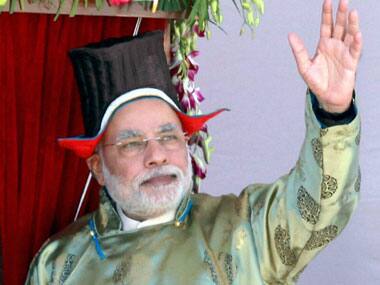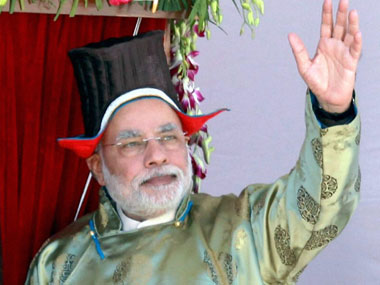It is a valid question to ask: why Prime Minister Narendra Modi said what he said during his visit to Kargil and Leh in Jammu and Kashmir on Tuesday, his second visit to the state in two months. In his address to men and officers of the Indian Army and the Air Force in Leh, Modi launched a frontal attack on Pakistan and said the neighbouring country “has lost the strength to fight a conventional war, but continues to engage in the proxy war of terrorism”. There are two ways of looking at the Modi barb on Pakistan. One, it is a “Change your policies or else” kind of admonition of Pakistan coming 13 days ahead of scheduled foreign secretary-level talks between India and Pakistan in Islamabad, thus signifying that nothing much should be read into the 25 August event. [caption id=“attachment_1661847” align=“alignleft” width=“380”]
 Prime Minister Narendra Modi in Leh on 12 August. PTI.[/caption] It may be argued that with this kind of aggressive posturing ahead of the major diplomatic outreach between the two countries, Modi would have lost the goodwill in Pakistan he had generated with his out-of-the-box diplomacy of inviting leaders of eight neighbouring countries, including Pakistan, for his inauguration ceremony on 26 May. But then Modi is a politician whose constituency is India, not Pakistan. It won’t matter much to him as to what the people and government of Pakistan think about him – not at this stage at least. Modi’s critics may say that with his remarks he has unilaterally killed an upcoming important diplomatic connect between the two governments even before it could be held. But then the Ministry of External Affairs has gone on record as saying that the upcoming foreign secretary-level talks are nothing but “talks for talks”. The message from the MEA is clear: that nothing substantive should be expected from these “talks for talks”. Two, one must appreciate the backdrop in which Modi’s comments were made. He was addressing a military audience in a state which was the scene of a limited war between India and Pakistan 15 years ago. One should not forget that Modi’s remarks have come just three days before the Independence Day. Also, what else he was expected to say? Praise Pakistan before an audience of army and the air force? And that too when Pakistan is on record to have made 25 ceasefire violations along the International Border and the Line of Control since the Modi government took over! Moreover, there is nothing that Modi has said that his predecessors have not said. Former Prime Minister Manmohan Singh had lambasted Pakistan scores of times over the neighbour’s role in fomenting terror in India despite his numerous peace efforts. Modi’s Pakistan remarks also give a sneak peek into his Independence Day speech and indicate that he would be talking about the recalcitrant neighbour in some detail. The Prime Minister has to be mindful of the fact that he himself as well his party made a lot of hard-hitting statements on national security, warned Pakistan (and even China) and roundly criticized the UPA government for its Pakistan policy during the high-octane campaigning in the April-May general elections. Expectedly, the Congress has already started turning the heat on the Modi government on a host of issues, including national security and the Pakistan factor. On Tuesday, for example, Congress spokesperson Abhishek Singhvi lampooned the Modi government by pointing out that 25 “officially documented” serious ceasefire violations had come about in just past 60 days, while many violations are not documented at all. “In the last 4-5 days we had 4. This is the new definition of national security of ‘achhe din’,” Singhvi said. However, Singhvi did not criticize Modi for his Pakistan remarks made in Jammu and Kashmir and said the Prime Minister was stating “a self evident truth”. The moral of the story is quite clear. One should not expect much from the 25 August talks in Islamabad. India’s Pakistan policy will continue to remain unchanged: that forward movement on peace talks with Pakistan can take place only when the Pakistani civil and military leaderships take credible steps in turning off the tap of terrorism. But that would be like a leopard to change its spots. There is nothing on the ground to show that Rawalpindi, headquarters of Pakistan army, is even considering budging from its decades-old strategy of using terrorism as an instrument of Pakistan’s foreign policy. Nothing substantive in India-Pakistan relations is going to happen till Modi meets his Pakistani counterpart. The two would inevitably meet on the sidelines of the United Nations General Assembly in New York in the last week of September and may have a structured meeting. The writer is Firstpost Consulting Editor and a strategic analyst who tweets @Kishkindha
Prime Minister Narendra Modi in Leh on 12 August. PTI.[/caption] It may be argued that with this kind of aggressive posturing ahead of the major diplomatic outreach between the two countries, Modi would have lost the goodwill in Pakistan he had generated with his out-of-the-box diplomacy of inviting leaders of eight neighbouring countries, including Pakistan, for his inauguration ceremony on 26 May. But then Modi is a politician whose constituency is India, not Pakistan. It won’t matter much to him as to what the people and government of Pakistan think about him – not at this stage at least. Modi’s critics may say that with his remarks he has unilaterally killed an upcoming important diplomatic connect between the two governments even before it could be held. But then the Ministry of External Affairs has gone on record as saying that the upcoming foreign secretary-level talks are nothing but “talks for talks”. The message from the MEA is clear: that nothing substantive should be expected from these “talks for talks”. Two, one must appreciate the backdrop in which Modi’s comments were made. He was addressing a military audience in a state which was the scene of a limited war between India and Pakistan 15 years ago. One should not forget that Modi’s remarks have come just three days before the Independence Day. Also, what else he was expected to say? Praise Pakistan before an audience of army and the air force? And that too when Pakistan is on record to have made 25 ceasefire violations along the International Border and the Line of Control since the Modi government took over! Moreover, there is nothing that Modi has said that his predecessors have not said. Former Prime Minister Manmohan Singh had lambasted Pakistan scores of times over the neighbour’s role in fomenting terror in India despite his numerous peace efforts. Modi’s Pakistan remarks also give a sneak peek into his Independence Day speech and indicate that he would be talking about the recalcitrant neighbour in some detail. The Prime Minister has to be mindful of the fact that he himself as well his party made a lot of hard-hitting statements on national security, warned Pakistan (and even China) and roundly criticized the UPA government for its Pakistan policy during the high-octane campaigning in the April-May general elections. Expectedly, the Congress has already started turning the heat on the Modi government on a host of issues, including national security and the Pakistan factor. On Tuesday, for example, Congress spokesperson Abhishek Singhvi lampooned the Modi government by pointing out that 25 “officially documented” serious ceasefire violations had come about in just past 60 days, while many violations are not documented at all. “In the last 4-5 days we had 4. This is the new definition of national security of ‘achhe din’,” Singhvi said. However, Singhvi did not criticize Modi for his Pakistan remarks made in Jammu and Kashmir and said the Prime Minister was stating “a self evident truth”. The moral of the story is quite clear. One should not expect much from the 25 August talks in Islamabad. India’s Pakistan policy will continue to remain unchanged: that forward movement on peace talks with Pakistan can take place only when the Pakistani civil and military leaderships take credible steps in turning off the tap of terrorism. But that would be like a leopard to change its spots. There is nothing on the ground to show that Rawalpindi, headquarters of Pakistan army, is even considering budging from its decades-old strategy of using terrorism as an instrument of Pakistan’s foreign policy. Nothing substantive in India-Pakistan relations is going to happen till Modi meets his Pakistani counterpart. The two would inevitably meet on the sidelines of the United Nations General Assembly in New York in the last week of September and may have a structured meeting. The writer is Firstpost Consulting Editor and a strategic analyst who tweets @Kishkindha
Consulting Editor, First Post. Strategic analyst. Political commentator. Twitter handle @Kishkindha.
)